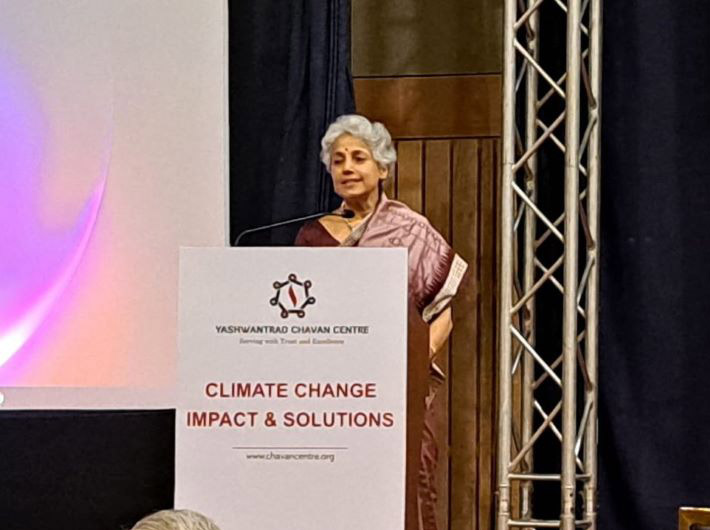Former WHO chief scientist says climate change is a concern not only for health but for existence itself
Soumya Swaminathan, former chief scientist of World Health Organisation (WHO), has said that more than pandemic, climate change is the concern to respect not only for our health but our very existence.
“More and more young people are having eco anxiety, worrying their children’s future which keeps them up at nights giving them nightmares because a lot written about negative impacts of climate change. Globally climate mitigation is most discussed. Unfortunately the developed world is talking more about vector borne diseases,” she said.
For India, she said, heat and heat impact is going to increase year after year. The numbers of heat wave days are going to be more prolonged and night temperatures are going to be higher.
Swaminathan was conferred with the Yashwantrao Chavan National Award 2023 in Mumbai on Tuesday. The award comprising Rs 5 lakh and a citation was given by Sharad Pawar, president of Yashwant Rao Chavan Centre. The award is named in the memory of the last chief minister of the erstwhile Bombay state who was also the first chief minister of Maharashtra after bifurcation.
The award selection committee headed by senior nuclear scientist Dr Anil Kakodkar chose Swaminathan, a paediatrician and clinical researcher renowned for her extensive work on HIV and tuberculosis for the honour.
Delivering a lecture on the occasion, she said that in coastal cities like Mumbai and Chennai the humidity factor adds to the impact of heat. “There's a certain level at which systems cannot function. The cardiovascular system will not be able to function anymore because the core temperature goes to a point where its shutting down … that's when you get into heat exhaustion… heat stroke ... if it's not recognised and treated … we really have to start thinking about how we are going to protect people today and tomorrow from the impacts that have already seen.”
She said, our crops, cropping patterns are changing. … the farmers … can't follow the old traditional ways that they were used to. Doing agriculture, so this is where we need to use technology. To better inform and guide people. Whether it's an individual trying to protect his own health, or a farmer who wants to know, when they should plant and how they should grow and they can water and when is the monsoon going to come etc. So they need advisories which are very relevant for them for today.
She said new technologies and AI are very powerful and do a lot of good for humanity but she cautioned that they also have the power of destruction, like fire. “Of course, it changed the lives of people who lived on this planet but it can be used also to harm… I think it's important to embrace technology but to also have ethics, ethical views and a debate within society as to how to use these technologies, about the need for regulations.”
She added that despite a great digital infrastructure that was used very wonderfully during Covid-19, with tele-medicine and tele-health and apps and many innovations in affordable diagnostics made in India and not just for India but the world for a disease like TB that she has worked on all her career, still does not have point of care diagnostic tests. Mumbai is the capital of multi-drug resistant TB.
She added that technology that we used around Covid-19 can not only be used to solve other major public health problems and also problems like climate change which needs a lot of innovation.
“So on one side we still got our basic needs…drinking water which is going to be another big issue with water shortage in many parts of the country. We need to address that very urgently today. We have malnutrition, anaemia and growing burden of over nutrition which is also leading to problems like Diabetes and so on. In sanitation, we have done a lot, we still have last mile to be covered.”
Swaminathan cautioned about future pandemics and said, “Future pandemics are going to be very likely, it's a question of when and not if and therefore we need to be prepared. We are seeing more and more jump of viruses from animals to humans for which there are a number of reasons including the fact that human beings have taken over the space which originally belonged to animals.”
People are trading in these animals, eating them and of course killing them and that's how the HIV virus actually got into humans. As we develop we also need to live in harmony with other species whether they are marine or over land because without diversity, without nature, we will not have quality of life either.”

